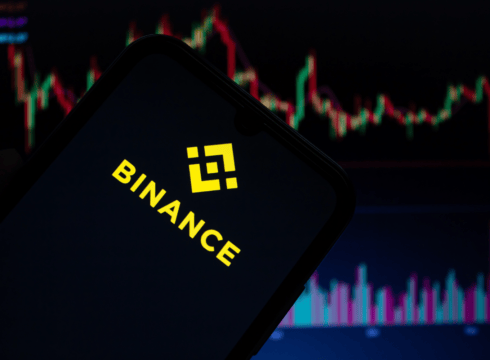Crypto traders in India often banked on the service to circumvent tax levied by the government on crypto trades
This comes amid media reports that said FIU has cleared applications of Binance and Kucoin to operate as virtual asset service providers in India
In January, the Indian government blocked access to Binance and eight other offshore crypto platforms for allegedly flouting anti money laundering norms
Inc42 Daily Brief
Stay Ahead With Daily News & Analysis on India’s Tech & Startup Economy
Currently banned by the Indian government, crypto exchange Binance has discontinued the cash payment option for peer to peer (P2P) trades conducted in rupees.
Until recently, Binance offered “escrow service” to crypto traders in India, enabling them to place a buy or sell order on the platform and settle the trade by making payments in the local currency.
Traders often banked on this service to circumvent the heavy tax levied by the Indian government on crypto trades.
However, Binance has halted the cash payment service on its platform for such P2P trades, Economic Times reported, citing sources.
While the P2P window with the rupee payment option has been disabled, Binance continues to allow crypto traders in the UAE to cut cash deals in UAE dirham, the report added.
Inc42’s queries to Binance did not elicit any response till the filing of this report.
The development comes just months after India blocked access to offshore crypto platforms such as Binance, Kucoin and OKX among others amid concerns that these platforms were being used for money laundering and tax evasion.
Consequently, the Ministry of Electronics and Information Technology (MeitY) also directed tech giant Apple to delist these crypto platforms from the iOS Store.
In December last year, the finance ministry’s Financial Intelligence Unit issued show-cause notices to nine offshore crypto exchanges, including Binance, Bitfinex and Kraken among others, for allegedly operating illegally in the country.
These offshore crypto exchanges were not registered with FIU as virtual asset service providers in India, and therefore, were flouting anti-money laundering norms by operating in the country.
In March 2023, the Indian government brought crypto businesses under the provisions of the Prevention of Money Laundering Act, 2022 (PMLA), mandating them to report suspicious transactions and conduct customer due diligence among others.
As per existing rules, offshore crypto exchanges are required to obtain a licence from FIU to operate as virtual asset service providers to trade in India.
Media reports suggest that FIU has cleared applications of Binance and Kucoin to operate as virtual asset service providers in India.
While Kucoin has paid fines to the tune of INR 35.5 Lakh for past non-compliances, Binance, which was banned in India in January, is planning a comeback to India after paying a $2 Mn penalty.
The government crackdown on offshore crypto trading platforms has proved to be a blessing in disguise for domestic exchanges.
Homegrown crypto exchanges had lost huge shares of trading volumes to offshore exchanges after India imposed a 30% tax on earnings from digital asset transfers, along with 1% TDS, on buyer’s payment in 2022.
Now, domestic exchanges are witnessing a boost in trading on their platforms. A case in point is CoinDCX which reportedly saw a 2,000% week-on-week surge in registrations as investors offloaded foreign holdings following the FIU notice.
Meanwhile, CoinSwitch has overtaken WazirX as the largest crypto exchange in India with 20 Mn users.
As per Inc42’s report, India is among the top 5 countries in P2P crypto trading, with 75% of traders aged under 35.
{{#name}}{{name}}{{/name}}{{^name}}-{{/name}}
{{#description}}{{description}}...{{/description}}{{^description}}-{{/description}}
Note: We at Inc42 take our ethics very seriously. More information about it can be found here.


